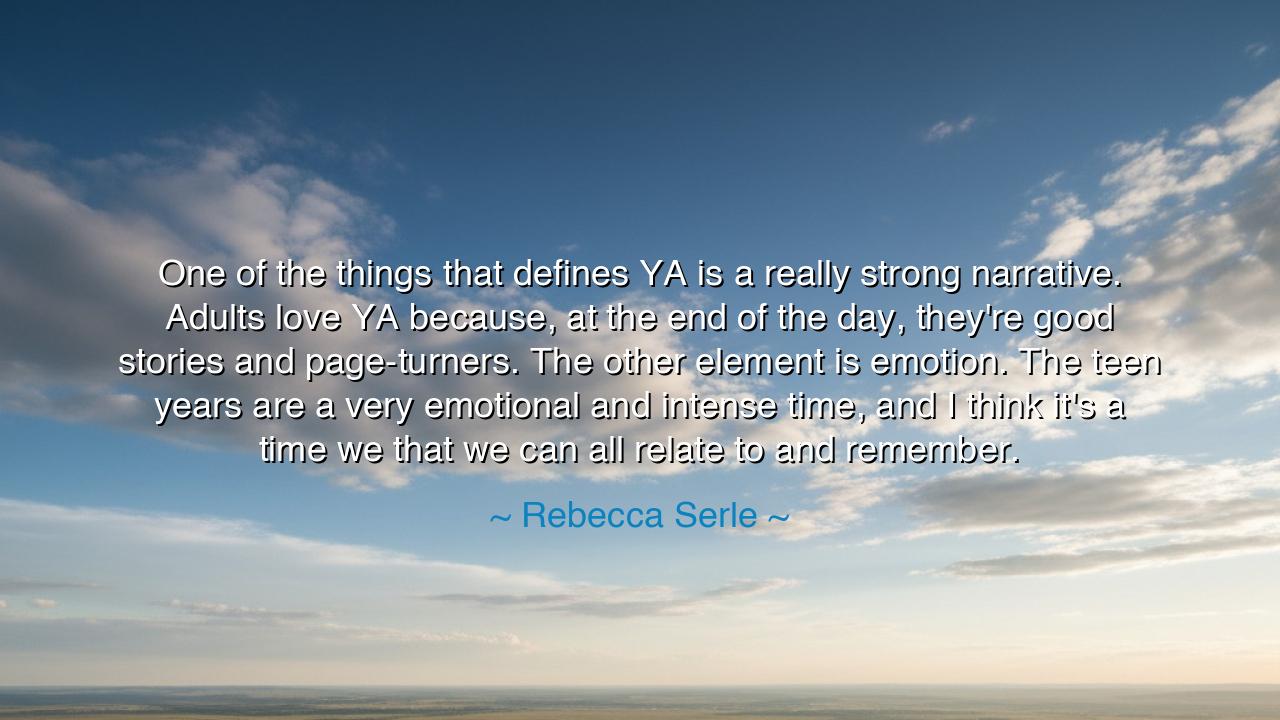
One of the things that defines YA is a really strong narrative.
One of the things that defines YA is a really strong narrative. Adults love YA because, at the end of the day, they're good stories and page-turners. The other element is emotion. The teen years are a very emotional and intense time, and I think it's a time we that we can all relate to and remember.






Hearken, O children of the ages, to the illuminating words of Rebecca Serle, who speaks of the enduring power of Young Adult (YA) literature. She observes that such works are defined by a strong narrative, capturing hearts and minds with stories that compel, intrigue, and unfold with irresistible momentum. Adults, too, are drawn to these tales, for beyond their youthful setting lies the universal appeal of a good story—a narrative that turns pages and awakens the imagination. In this reflection, we see that the craft of storytelling transcends age, bridging generations through the shared delight of narrative artistry.
Since the dawn of storytelling, humans have sought tales that grip the soul. In ancient Greece, epic poems like The Iliad and The Odyssey enthralled young and old alike, their heroes, trials, and triumphs resonating with every heart. Serle’s observation mirrors this ancient principle: it is the compelling arc, the tension and resolution, that draws readers in, regardless of the ages of the protagonists. A story well told is timeless, a vessel carrying wisdom, wonder, and emotional resonance across generations.
Consider the story of J.K. Rowling, who, though writing for the young, created works that captured the devotion of millions of adults. Harry Potter is not merely a tale of magic; it is a testament to the power of strong narrative and universal human experience. Through compelling plot, vivid world-building, and the trials of adolescence, readers of all ages find themselves enthralled. Serle reminds us that this narrative strength is a defining hallmark of YA literature, drawing the young and mature alike into the shared journey of story.
Yet, narrative alone is not sufficient; Serle emphasizes the element of emotion. The teen years are a crucible of feeling, where love, fear, joy, and sorrow are experienced with unparalleled intensity. YA literature mirrors this intensity, allowing readers to relive and reflect upon the passions and conflicts of adolescence. Ancient storytellers, too, recognized the importance of emotional engagement: tragedy and comedy alike were crafted to stir the heart, to illuminate the human condition through feeling as well as plot.
The reflection also illuminates the universality of adolescent experience. Serle notes that these emotions—intense, confusing, exhilarating—are relatable to all who have journeyed through youth. Adults remember the turbulence, the exhilaration, the heartbreak, and the wonder of those formative years. In reading YA, they reconnect with a part of themselves long past but never forgotten, and in this, the stories become bridges between generations, teaching empathy, reflection, and understanding.
The lesson here is profound: a story is more than words upon a page; it is a vessel for connection, reflection, and shared humanity. YA literature, by combining narrative strength with emotional truth, captures the essence of life’s formative experiences. It reminds us that the passions of youth, though intense and fleeting, are the forge of character, insight, and imagination. To engage with these stories is to honor the depth of human experience across ages.
Practical guidance emerges from this insight. Seek out stories that captivate both heart and mind, stories that combine compelling narrative with emotional resonance. Reflect upon the emotions of your own youth and allow the narrative to illuminate your understanding of yourself and others. Share these stories with young readers, fostering dialogue and empathy, and recognize that a well-told tale is a powerful tool for learning, connection, and remembrance.
Thus, heed the timeless teaching of Rebecca Serle: the strength of a story lies in both its narrative power and the intensity of the emotion it conveys. YA literature, in capturing the passions of adolescence, offers lessons not only for the young but for all who have traversed the years of youth. By embracing these stories, we honor the universality of experience, the power of storytelling, and the enduring capacity of narrative to enlighten, move, and connect generations across the ages.






AAdministratorAdministrator
Welcome, honored guests. Please leave a comment, we will respond soon